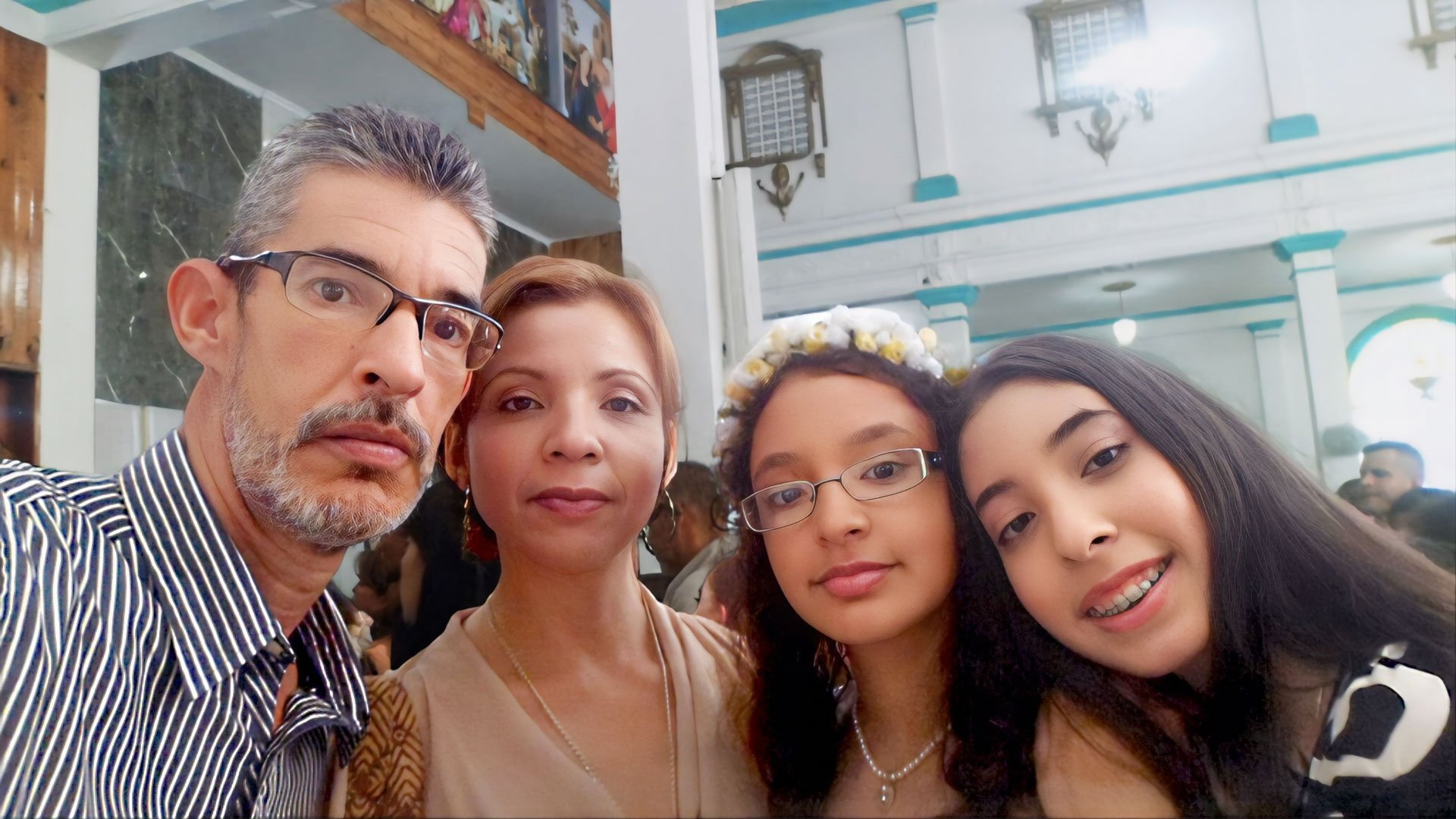

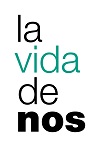
As much as they tried to avoid it, they eventually had no choice but to take Néstor Comellas to the Antonio Patricio de Alcalá University Hospital in Cumaná, state of Sucre, Venezuela, to receive treatment for the cancer he had been diagnosed. The medical facility was filled beyond capacity and falling to pieces, but that is where he arrived as an emergency patient, choking, the night of December 21, 2022. His daughter, Corina Comellas, walks us through their ordeal.
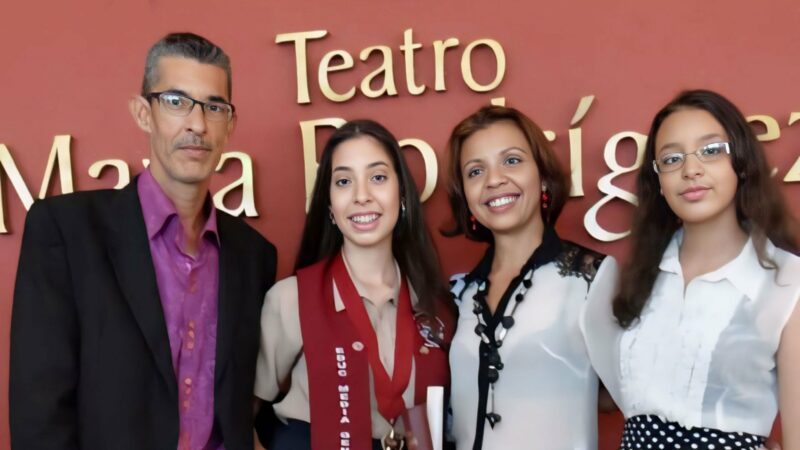 PHOTOS: FAMILY ALBUM
PHOTOS: FAMILY ALBUMThe morning of December 22, 2022, I packed my bag with the stuff I had to bring with me to the Antonio Patricio de Alcalá University Hospital (also known by its Spanish acronym of HUAPA), —where my parents had been staying since the night of the 21st—, including towels, bed sheets, coats, alcohol, syringes, breakfast, cigarettes, and coffee. I called my mother for the umpteenth time to make sure that I got everything they needed.
— “No, sweetie. Get over here now. The surgeon has just arrived and they are about to see your dad.”
We both pretended everything was fine, as if we were having a normal, everyday conversation, but the truth is that we were going through a hell of a crisis. My parents were freezing cold and had not slept a wink, waiting for an oncologist to examine my dad, whose throat was slowly closing up.
He had been diagnosed with skin cancer five months earlier, but his already feeble body seemed to be more affected by what looked like a lingering cold. During the ten minutes that followed that phone call, I stepped out our door more than five times to see if my neighbor had finally started his SUV. He had kindly volunteered to take me to the hospital to spare me the 30-minute bus ride to downtown Cumaná, and from there to the health center, carrying the heavy bag.
My heart raced when I got another call.
— “Baby, hurry up!” my mom pleaded, crying. “Your dad went into respiratory arrest. They ordered me out. I don’t know what’s going on!”
The phone call was cut off. I tried to contact her, to no avail.
A couple of seconds later, my cellphone rang again.
— “Cori, hurry up! Your dad died… and I am here all by myself. Please, come!” she yelled.
Without having fully comprehended what had just happened, and still waiting for the ride that would take me to the hospital, I broke the news to Valeria, my only sister. Our neighbor moved quickly and had his car ready. The 15-minute ride to the hospital seemed like an eternity to me. We drove past the morgue, the ER, and finally made it to the main entrance. My mom was there, alone, her knees almost touching the ground, trying to pull herself together.
She didn’t tell me what had happened. I didn’t ask her either. I don’t remember what we said to each other. I only know that I followed her like a robot across the hospital’s corridors until we were handed over my dad’s death certificate and the funeral home took his corpse to the morgue. In the meantime, my sister was laying out the clothes he would be wearing for the service; we had agreed that the color black was off limits because happy people need color in life and in death.
It happened so fast…
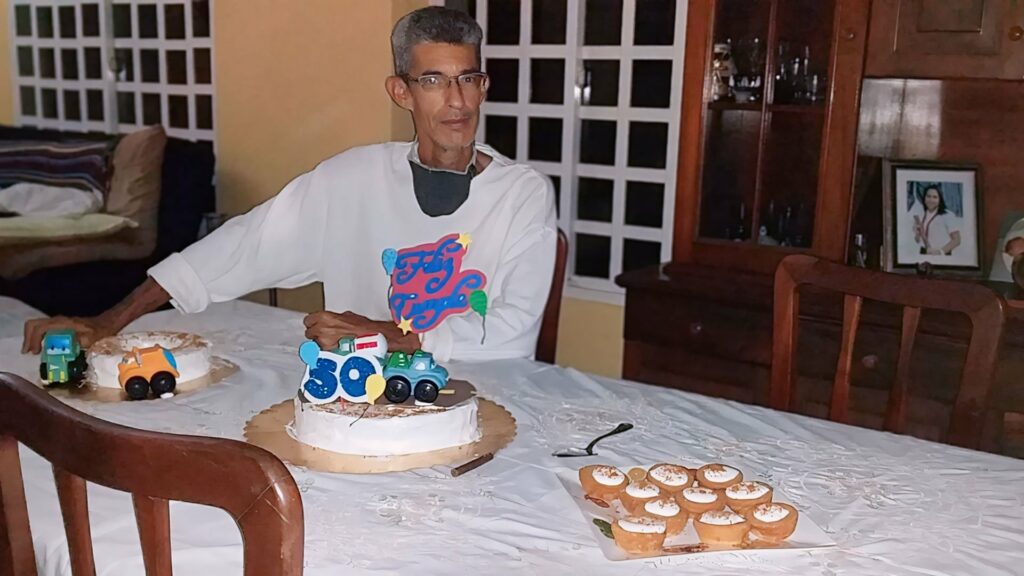
It all began in January of 2022, when my dad, Néstor Comellas, a 50-year-old energetic, healthy man, was nursing a cold and noticed that he had a small lump inside his nose.
The small lump was making it hard for him to breathe, but it didn’t look serious.
I insisted for months that he go to the Dr. Julio Rodríguez Hospital, also known as the Los Veteranos hospital. We’d rather go there than to the HUAPA, where I heard many people had contracted an infection. Besides, we couldn’t afford a private practice because none of us had a stable job.
As the weeks went by, he tired easily and caught every cold there was, but, other than that, he had no symptoms. But the small lump had grown up to such an extent that he went from feeling an uncomfortable pressure on the bridge of his nose when he wore his reading glasses to actually having a markedly deviated septum.
He would eventually lose his sense of smell.
By June, the small lump was small no longer. Therefore, my dad decided to visit an otorhinolaryngology specialist, who told him that it could be a nasal polyp and ordered him a biopsy. The results came in: he had squamous-cell carcinoma of the right nasal cavity and sinuses and part of the trachea.
According to the doctors, it is a rare type of skin cancer that’s often diagnosed at an advanced stage, which limits patient prognosis for recovery. My dad risked blindness and brain damage because every bone in his face was being affected by the disease.
Truth be told, it was not that far-fetched: he had been exposed his whole life to the risks associated with the disease, such as handling chemical products without protective gear, and being out in the sun for long hours, which he did for more than ten years when he worked in a fishing vessel.
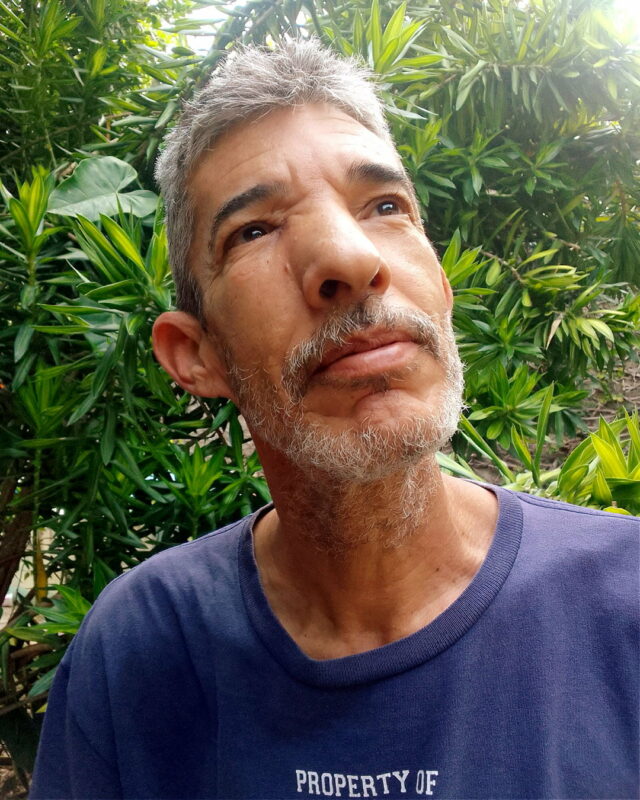
The first oncologist we consulted suggested my father undergo surgery to remove the tumor, but the $7,000 procedure was too costly for us and difficult to plan. On the other hand, they didn’t have the necessary equipment in Cumaná, so we would have to travel to Táchira, halfway across the country, where said oncologist had a colleague he could team up with to perform the operation.
We tried another physician, Dr. Vitelio Patiño, who ordered my dad eight sessions of chemotherapy. After the fourth, he would be subjected to further testing in order to determine the number of radiotherapy treatment sessions he would ultimately need.
As much as we had tried to avoid it, we went to the HUAPA to have his name added to the list of cancer patients in need of care. We simply couldn’t go to a private clinic and we had been told that patients were actually being provided oncology therapy at the HUAPA, which was true; the thing is that the hospital was filled beyond capacity because patients from all fifteen municipalities of the states of Sucre, Anzoátegui, and Nueva Esparta went there for treatment.
We applied for a slot in August and were scheduled one for early October. We would have to wait. The radiotherapy machine, which was run by the Venezuelan Institute of Social Security —or IVSS, by its Spanish acronym—, was out of order, but it could be repaired in time for our appointment.
Now that we had a plan, we needed help to weather the storm coming our way. We had to buy medicines and medical supplies and feed Dad a special diet to keep his blood values within normal ranges. We estimated the costs to be around $200 per chemo cycle. I mean, we needed a lot of help.
One day, about a month before the start of the treatment, I was on a bus on my way downtown. I kept repeating to myself that everything would be all right, as I hid my glassy eyes behind my old sunglasses and tried to ease my mind by focusing on my surroundings. I got off at the bus stop and walked to Atarraya, the hyperlocal digital media outlet where I worked. There wasn’t a soul in sight. That’s when I started to cry.
— “You need to calm down. No one must know about this,” I thought.
But then, having composed myself a bit, I grabbed my cell phone and wrote in my Instagram and WhatsApp statuses:
— “Thank you to those who have reached out. My dad was diagnosed with skin cancer.”
Friends and relatives organized raffles and fundraisers, and we received the support of the people we least expected.
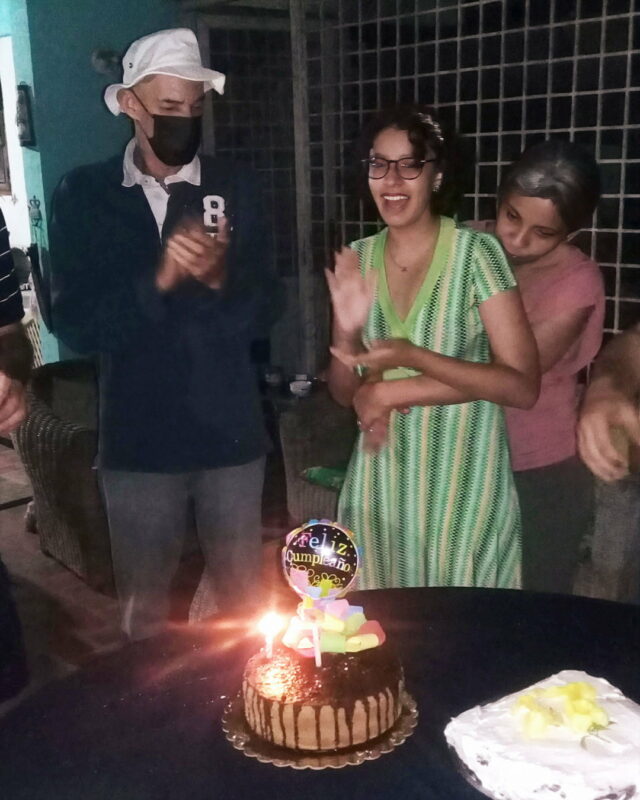
Dad’s first session was on October 3, 2022.
He was given chemo for three consecutive days, followed by a 19-day break. My mom went always with him. The HUAPA oncology area was operational after all. We couldn’t help but notice, however, that they used water leaking from the air conditioning system to keep it clean, and also to flush the toilets, for not a drop came out of the pipes. And patients have to bring everything they are told they are going to need, including adhesive dressings, sterile cotton, syringes, and saline solution.
We got the chemo at one of the IVSS pharmacies that distribute high-cost prescription drugs for free. Often times, though, they were past their expiration date or incomplete. That’s why the bulk of the treatment we had to buy elsewhere or was donated to us. I remember that, for the third cycle, we couldn’t find the required units of cisplatin —one of the medications he had been prescribed—, and we had no choice but to use the ones we had been given by the IVSS, even though they were three months past their expiration date, which caused my dad a severe allergic reaction.
From December 20 to December 21, he was flat on his back with the flu. He was running a high fever, had difficulty breathing, and was dehydrated. We gave him saline and nebulized him with a portable nebulizer we have at home.
On the night of the 21st, he was shivering violently and uncontrollably for two to five minutes straight. Mom, Valeria tried to soothe him and keep him warm while he said he was sorry for putting us in that situation.
At around 11:00 pm, we decided to ask a neighbor to take him to an ambulatory clinic nearby. My mom didn’t leave his side. He was given first aid and nebulized, but he needed oxygen therapy and they had not enough oxygen there. So, they suggested they take him to the HUAPA.
Valeria, Grandma, and I were home, receiving updates from Mom, until we didn’t anymore.
The last thing she told us that night was that they were “chilled to the bone.”
I wish I could have been there or at least brought them a blanket and sweaters to keep them warm. Struggling to hold back the tears, I dozed off for a couple of hours.
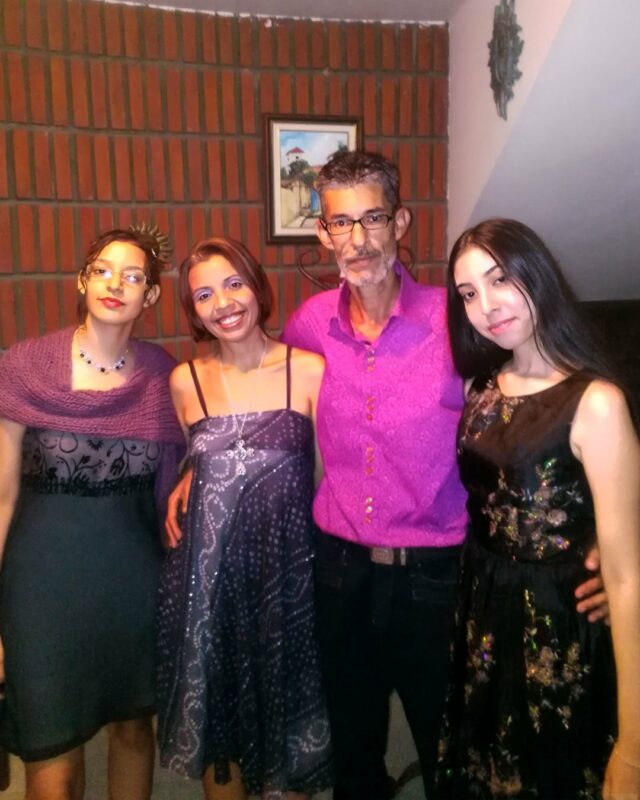
The following morning, Dad’s throat had blocked to the point that no air was passing from his nostrils into his lungs. The doctors tried to perform a tracheotomy to help him breathe, but they failed.
That’s when my mom called with the news I would never have wanted to hear.
Respiratory arrest.
Death.
Our lives have been upended ever since.
The absence of a loved one makes you think of all the things that will no longer be.
We didn’t celebrate Christmas that year. My dad wasn’t there with me when I presented my university degree project. He won’t be there either for my sister during her thesis defense and graduation ceremony.
He will be no more.
But I still remember our last dance, the special school events, our times of celebration, and our complicity in the small things of life.
That’s how I will remember el flaco, the one who would walk around with his reading glasses, a cup of coffee, and a cigarette, greeting everyone who crossed his path.
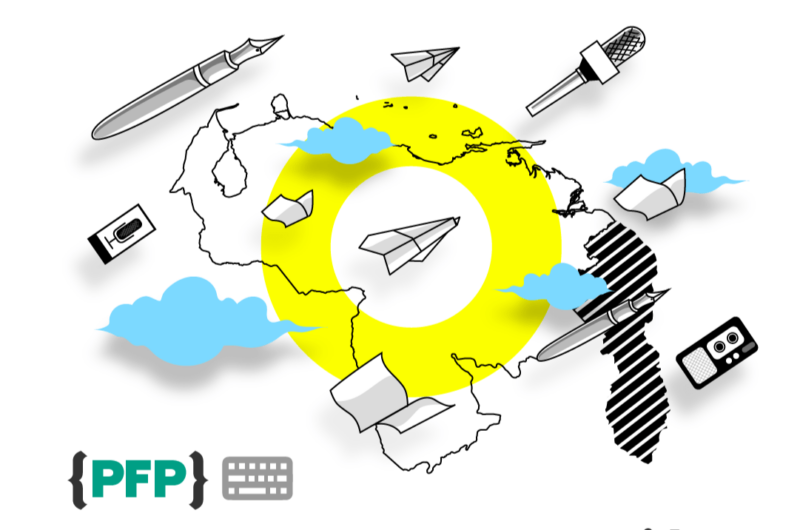
This story was written within the framework of the first edition of the Training for Journalists program of La Vida de Nos.
626 readings
Una historia bien contada, con muchos detalles para procesar. Toca la fibra desde el comienzo, ¡felicidades!